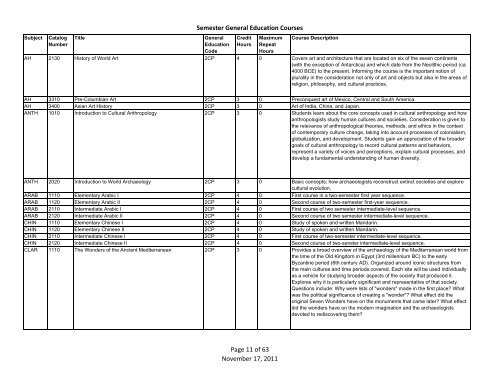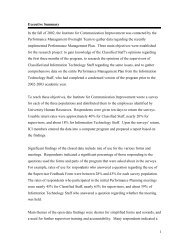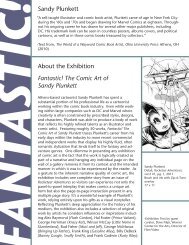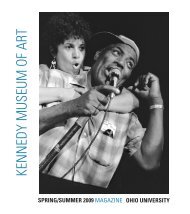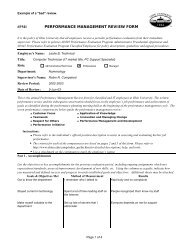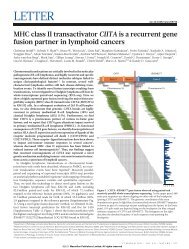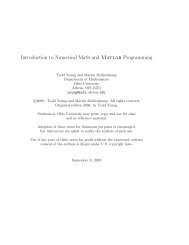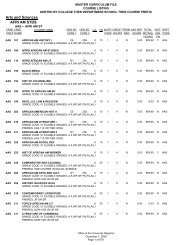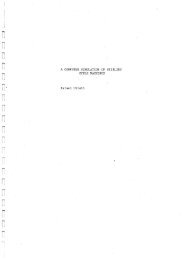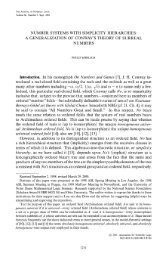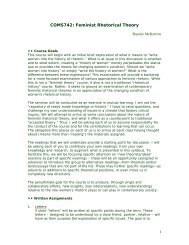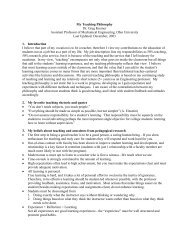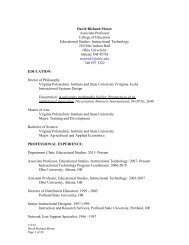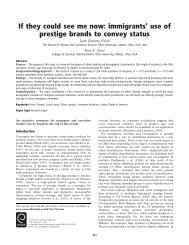Semester General Education Courses - Ohio University
Semester General Education Courses - Ohio University
Semester General Education Courses - Ohio University
Create successful ePaper yourself
Turn your PDF publications into a flip-book with our unique Google optimized e-Paper software.
Subject<br />
Catalog<br />
Number<br />
Title<br />
<strong>Semester</strong> <strong>General</strong> <strong>Education</strong> <strong>Courses</strong><br />
<strong>General</strong><br />
<strong>Education</strong><br />
Code<br />
Credit<br />
Hours<br />
Maximum<br />
Repeat<br />
Hours<br />
Course Description<br />
AH 2130 History of World Art 2CP 4 0 Covers art and architecture that are located on six of the seven continents<br />
(with the exception of Antarctica) and which date from the Neolithic period (ca<br />
4000 BCE) to the present. Informing the course is the important notion of<br />
plurality in the consideration not only of art and objects but also in the areas of<br />
religion, philosophy, and cultural practices.<br />
AH 3310 Pre-Columbian Art 2CP 3 0 Preconquest art of Mexico, Central and South America.<br />
AH 3400 Asian Art History 2CP 3 0 Art of India, China, and Japan.<br />
ANTH 1010 Introduction to Cultural Anthropology 2CP 3 0 Students learn about the core concepts used in cultural anthropology and how<br />
anthropologists study human cultures and societies. Consideration is given to<br />
the relevance of anthropological theories, methods, and ethics in the context<br />
of contemporary culture change, taking into account processes of colonialism,<br />
globalization, and development. Students gain an appreciation of the broader<br />
goals of cultural anthropology to record cultural patterns and behaviors,<br />
represent a variety of voices and perceptions, explain cultural processes, and<br />
develop a fundamental understanding of human diversity.<br />
ANTH 2020 Introduction to World Archaeology 2CP 3 0 Basic concepts; how archaeologists reconstruct extinct societies and explore<br />
cultural evolution.<br />
ARAB 1110 Elementary Arabic I 2CP 4 0 First course in a two-semester first year sequence.<br />
ARAB 1120 Elementary Arabic II 2CP 4 0 Second course of two-semester first-year sequence.<br />
ARAB 2110 Intermediate Arabic I 2CP 4 0 First course of two semester intermediate-level sequence.<br />
ARAB 2120 Intermediate Arabic II 2CP 4 0 Second course of two semester intermediate-level sequence.<br />
CHIN 1110 Elementary Chinese I 2CP 4 0 Study of spoken and written Mandarin.<br />
CHIN 1120 Elementary Chinese II 2CP 4 0 Study of spoken and written Mandarin.<br />
CHIN 2110 Intermediate Chinese I 2CP 4 0 First course of two-semester intermediate-level sequence.<br />
CHIN 2120 Intermediate Chinese II 2CP 4 0 Second course of two-senster intermediate-level sequence.<br />
CLAR 1110 The Wonders of the Ancient Mediterranean 2CP 3 0 Provides a broad overview of the archaeology of the Mediterranean world from<br />
the time of the Old Kingdom in Egypt (3rd millennium BC) to the early<br />
Byzantine period (6th century AD). Organized around iconic structures from<br />
the main cultures and time periods covered. Each site will be used individually<br />
as a vehicle for studying broader aspects of the society that produced it.<br />
Explores why it is particularly significant and representative of that society.<br />
Questions include: Why were lists of "wonders" made in the first place? What<br />
was the political significance of creating a "wonder"? What effect did the<br />
original Seven Wonders have on the monuments that came later? What effect<br />
did the wonders have on the modern imagination and the archaeologists<br />
devoted to rediscovering them?<br />
Page 11 of 63<br />
November 17, 2011


